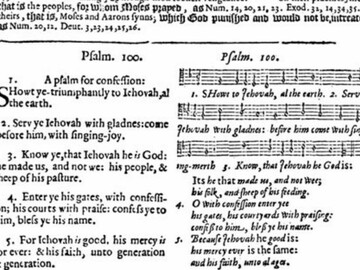Giving Thanks in Song - Psalm 100
- Date
- 1612
- Material
- Song, Paper
- Author/Maker
- Henry Ainsworth (1571 - 1622)
- Source
- The Book of Psalmes: Englished both in Prose and Metre with Annotations

Description
Many Mayflower passengers were members of a Puritan sect known as Separatists; others remained within the Church of England. All, however, were thorough Protestants of the recent Reformation. It is impossible to understand the outpouring of gratitude inherent in the harvest feast in 1621 without exploring the faith that pervaded every area of their lives.
Separatism was part of the larger English Reformation of the 16th century. This movement sought to “purify” the Church of England of its corrupt human doctrine and practices; the people in the movement were known as “Puritans.” Puritans rejected Christmas, Easter and the various saints’ days because they had no scriptural justification. In the worship service, for the same reason, they rejected hymns, the recitation of the Lord’s Prayer, and creeds. Separatists were those Puritans who no longer accepted the Church of England as a true church, refused to work within the structure to affect changes, and “separated” themselves to form a true church based solely on biblical precedent.1 The Separatists believed that the worship of God must progress from the inner human directly to God, and that “set” forms of prayer interfered with that progression by directing a person's thoughts down and inward. The only exceptions were the psalms and the celebration of the Lord's Supper, both of which had scriptural basis, and the covenant by which individuals joined the congregation. Sabbath services were held twice on Sunday. In addition, sermons were often given on Thursdays and, as occasion demanded, days of thanksgiving or fasting and humiliation were proclaimed. These latter were movable weekday holidays called in response to God’ s Providence. Both were observed in a manner similar to the weekly Sabbath, with morning and afternoon services.
Psalms were the only music allowed in the service. Hymns were rejected because they had no scriptural basis. The versions of the psalms used in Plymouth Colony came from Henry Ainsworth’s psalter, in which he had “Englished” the psalms in prose and meter, and set them to livelier music than had been heard before. These were sung, in unison and without musical accompaniment, by the whole congregation to focus on understanding the Bible as the word of God. Years later, in the 1670s, when the first generation of colonists—many of whom had musical training—had died, the colonists had difficulty with the music of the psalms. At this point, the practice of “lining out” began. In lining out, each line of the psalm is first sung by the leader, then repeated by the congregation.
Given the social hierarchy of the period, women, children and servants had very little say in the running of the community. Pilgrim Pastor John Robinson nuanced Paul’s interpretation. In his writings, Robinson specified the appropriate ways in which women could be involved in the life of the church:
And for women, they are debarred by their sex, as from ordinary prophesying, so from any other dealing wherein they take authority over the man...yet not simply from speaking; they may make profession of faith, or confession of sin, say amen to the church’s prayers, sing psalms vocally, accuse a brother of sin, witness an accusation, or defend themselves being accused, yea, in a case extraordinary, namely where no man will, I see not but a woman may reprove the church, rather than suffer it to go on in apparent wickedness, and communicate with it therein.2
Women, therefore, did not take an active part in preaching, praying or prophesying, confining their activities to the singing of psalms and saying “Amen” at the end of prayers.
Media

Transcription
Shout to Jehovah all the earth
Serve thee Jehovah with Gladness
Before him come with singing mirth
Know that Jehovah he god is.
Tis he that made us and not we,
His folk and sheep of his feeding.
O with confession enter thee
His gates, his courtyards with praising.
Confess to him, bless thee his name.
Because Jehovah he good is,
His mercy ever is the same,
And his faith unto all ages.
Psalm 100
View PDFDiscussion Questions
-
Describe the song in your own words. What is the tempo? Is it loud or soft? What instruments do you hear?
-
What feelings are being expressed in this song? How can you tell?
-
What do the lyrics mean to you? What do you think they meant to an English colonist?
-
Why was singing an important part of church services in the 17th century?
-
How did singing give women a voice in church services?
-
What does music mean to you?
-
How do you show gratitude?